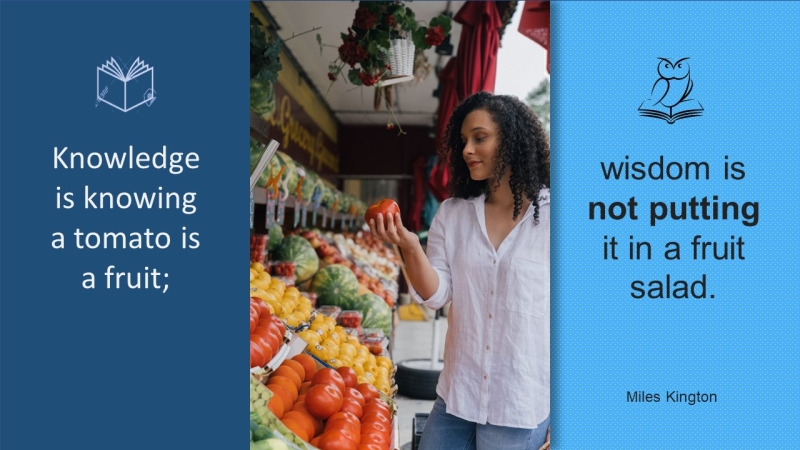LET’S UNLOCK THE POWER OF WIDOM TO LEAD A MORE FULFILLING LIFE. While knowledge is about facts and information, wisdom is about applying that knowledge practically and thoughtfully. To this end, you must understand the importance of wisdom in personal growth and how to move beyond knowledge.
This article explores the definition of wisdom, the benefits it brings, and the challenges of pursuing it. Find out how to cultivate wisdom through self-reflection, diverse perspectives, and mindfulness.
What is Wisdom?
When it comes to personal growth, one of the most critical qualities to cultivate is wisdom. But what exactly is wisdom? Let’s take a closer look.
Wisdom is using knowledge and experience to make good decisions and judgments. It’s about having a deep understanding of yourself and the world around you and using that understanding to navigate life’s challenges thoughtfully and meaningfully.
What is the Difference Between Knowledge and Wisdom?
Before diving into wisdom’s role in personal growth, it’s essential to understand the difference between knowledge and wisdom. While knowledge is about having information, wisdom is about using that information thoughtfully and practically. Some critical distinctions between the two are as follows:
- Knowledge is about knowing the facts, while wisdom practically applies those facts.
- Knowledge is about understanding what happened, while wisdom understands why it happened.
- Knowledge can be acquired through learning, while wisdom is gained through experience and reflection.
The Relationship Between Wisdom and Intelligence
Wisdom and intelligence are often used interchangeably, but they are different. Intelligence is about having knowledge and cognitive abilities; wisdom is about using that knowledge thoughtfully and meaningfully.
Some studies have shown only a moderate correlation between intelligence and wisdom. This means you can be knowledgeable but not necessarily wise, and vice versa.
Intelligence can help us acquire knowledge, whereas wisdom allows us to use that knowledge to benefit ourselves and those around us.
Wisdom is a critical quality to cultivate for growth and development. You can become wiser and more thoughtful by developing empathy, humility, self-awareness, and flexibility. And remember, while intelligence can be helpful, wisdom allows us to use that intelligence to benefit ourselves and the world around us.
Why Knowledge Isn’t Enough
While knowledge is essential, it’s not enough to drive personal growth and development. Here’s why:
Knowledge Has Its Limitations
At its core, knowledge is about understanding information and facts. While this is helpful, it’s limited in its ability to guide us through life’s challenges. Knowledge alone doesn’t tell us how to make good decisions or navigate complex relationships. For that, we need wisdom.
Relying on Knowledge without Wisdom Can Be Harmful
When we rely solely on knowledge, we can become rigid and inflexible. It’s easy to get stuck in a rut where we only consider ideas and viewpoints that confirm our preconceived notions. This can lead to a narrow-mindedness that limits our growth and potential.
Examples
There are many examples of how knowledge without wisdom can be harmful. For instance, brilliant scientists may be able to develop new technology. Still, without considering the ethical implications of their work, they may do more harm than good. Similarly, a CEO who is highly knowledgeable about their industry may make decisions that benefit the bottom line. Still, they may need to consider the impact on their employees or the environment to cause more problems than they solve.
Knowledge is undoubtedly necessary but not enough to drive personal growth and development. We need the wisdom to guide us through life’s challenges and make good decisions. When we rely solely on knowledge, we risk becoming narrow-minded and inflexible. So let’s focus not just on acquiring knowledge but on developing wisdom. Doing so can make us wiser, more compassionate, and more effective in all areas of our lives.
The Benefits of Wisdom
Now that we’ve explored what wisdom is and why it’s essential, let’s dive into the benefits of wisdom for personal growth and development.
Wisdom Enhances Decision-Making
One of the critical benefits of wisdom is that it enhances decision-making. When we have wisdom, we can consider a broader range of factors and perspectives before deciding. We’re better able to balance short-term and long-term considerations, and we’re able to make decisions that are both ethical and effective.
Wisdom Improves Emotional Intelligence.
Another benefit of wisdom is its role in emotional intelligence. Emotional intelligence is about understanding and managing our own emotions and the emotions of others. When we have wisdom, we can better navigate complex emotional situations. We can empathize with others, communicate effectively, and healthily manage our emotions.
Wisdom Can Lead to a More Fulfilling Life
Finally, wisdom can lead to a more fulfilling life. Wisdom allows us better to understand our values, goals, and aspirations. We can better prioritize what’s essential and make choices that align with our deepest values. As a result, we can live a more authentic and meaningful life.
Wisdom is essential for personal growth and development. It enhances decision-making, plays a critical role in emotional intelligence, and can lead to a more fulfilling life. So let’s focus not just on acquiring knowledge but on developing wisdom. Doing so can make us wiser, more compassionate, and more effective in all areas of our lives.
How to Cultivate Wisdom
As wisdom is often gained through experience, there are things you can do to cultivate it in your own life. The following are some methods you can employ to acquire wisdom in your own life:
Practicing Self-Reflection and Introspection
One of the most important ways to cultivate wisdom is self-reflection and introspection. This necessitates introspective thinking about experiences, values, and beliefs. It means looking hard at your biases and assumptions and being ready to question them when needed. By taking the time to understand yourself, you’ll have more tools to make intelligent choices and navigate complex situations.
Seeking Out Diverse Perspectives and Experiences
Another critical strategy for cultivating wisdom is seeking out diverse perspectives and experiences. This means being open to different viewpoints and ways of thinking and actively seeking opportunities to pick up new insights from those with whom you disagree. Understanding the world from various perspectives is an integral part of becoming wise. You can do this by going to new places, having deep conversations with people from different backgrounds, or reading books and articles that challenge your assumptions.
Maintaining a Mindful and Present Attitude
Finally, practicing mindfulness and staying present is essential for cultivating wisdom. Mindfulness involves being fully present at the moment without judgment or distraction. When we’re mindful, we’re better able to tune in to our thoughts and emotions, and we’re more open to the experiences of others. This can help us develop empathy, compassion, and a fuller understanding of the world.
Cultivating wisdom is essential for personal growth and development. By self-reflection, seeking out diverse perspectives and experiences, and practicing mindfulness, we can develop the wisdom to make wise decisions, navigate complex situations, and live more fulfilling lives. Next time you face a difficult decision, remember that wisdom is the key to personal growth and success. So let’s commit to cultivating wisdom and inspiring others to do the same. Together, we can create a wiser, more compassionate, and more just world.
Characteristics of Wise People
So what are some of the characteristics of wise people? Here are a few key traits to look for:
-
- Empathy: Wise people have a deep understanding of the emotions and experiences of others. They are compassionate and caring and can relate to people sincerely.
- Humility: Wise people are humble and grounded. They understand they don’t have all the answers and are open to learning from others.
- Self-awareness: Wise people have a deep understanding of themselves, including their strengths, weaknesses, and values. They can make decisions that align with who they are and what they stand for.
- Flexibility: Wise people can adapt to changing circumstances and are open to new ideas and experiences. They are not rigid or set in their ways but are always willing to grow and evolve.
The Challenges of Pursuing Wisdom
As you try to get wiser, you’ll face challenges and problems that can make the path seem hard. But don’t let that discourage you! These challenges are opportunities for growth and personal development.
Biases and Preconceptions
One of the biggest challenges of pursuing wisdom is overcoming biases and preconceptions. We all have our beliefs and ideas that we’ve developed over time, and it can be hard to let go of them. But to cultivate wisdom, we need to be open-minded and willing to consider new ideas and perspectives.
One way to overcome bias is to expose yourself to diverse perspectives and experiences. Seek out people with different backgrounds and beliefs than you, and listen to what they say. Try to approach each conversation with an open mind and be willing to challenge your assumptions.
Uncertainty and Ambiguity
Another challenge in pursuing wisdom is dealing with uncertainty and ambiguity. Wisdom involves accepting many things we don’t know and can’t control and being comfortable with that uncertainty.
To cultivate this skill, practice mindfulness and stay present at the moment. Forget about the past and the future and concentrate on what you can control in the present. Practice being comfortable with uncertainty and having only some of the answers.
Humility and Continuous Learning
Finally, pursuing wisdom requires humility and a willingness to learn continuously. No matter your knowledge or experience, there is always more to learn and ways to improve.
Cultivate a growth mindset and see each challenge or failure as an opportunity for learning. Be bold and ask questions, and seek out feedback from others. And above all, approach your pursuit of wisdom with a humble and open heart, knowing there is always more to discover and learn.
Conclusion
Congratulations! You have learned about the power of wisdom in personal growth. Remember, knowledge can only take you so far. But wisdom, the ability to apply knowledge thoughtfully and discerningly, truly allows you to thrive and live a fulfilling life.
To recap, wisdom is characterized by empathy, compassion, and emotional intelligence. It helps us make better decisions, deal with difficult situations, and get closer to others. It also leads to a greater sense of purpose and meaning in life.
To get wiser, it’s essential to think about yourself regularly, look for different points of view, and practice mindfulness. But remember, the pursuit of wisdom is not without its challenges. It requires facing our biases, dealing with uncertainty, and staying humble despite our flaws.
But don’t be discouraged! You can get through these problems and keep getting smarter with practice and hard work. As you integrate the lessons of wisdom into your life, you’ll find that you’re better equipped to handle whatever challenges and live a truly fulfilling life.
So go forth and cultivate wisdom, my friends. Do it now, and your future self will be grateful.
CLICK THE IMAGE TO LEARN MORE




